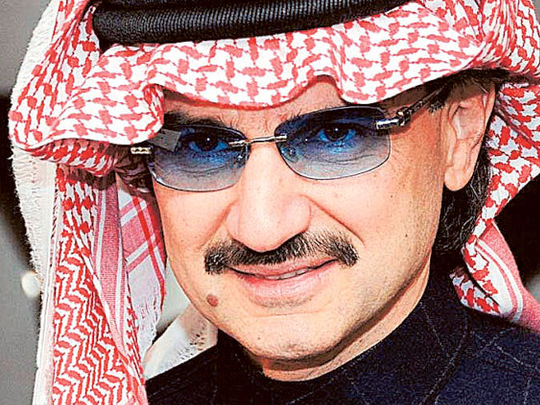
Dubai: Saudi Prince Al Waleed Bin Talal’s highly publicised firing of celebrity Kuwaiti speaker Tareq Al Suwaidan comes at a time when his media empire and the influence it wields is on the rise.
Prince Al Waleed said in a letter as reiterated on Twitter that he had dismissed the popular Kuwaiti personality on the grounds of his admission on a Yemeni television channel of belonging to the leadership of the Muslim Brotherhood, which he called a “terrorist organisation” on Twitter.
A significant proportion of the Arab viewer, listener or reader’s media consumption comes from outlets owned by Prince Al Waleed’s media empire, giving the prince significant influence over access to information available to Arabs. He is known to take a personal interest in the media outlets he controls, and does not shy away from intervening when the need arises.
Prince Al Waleed has a particularly strong business partnership with controversial media tycoon Rupert Murdoch, who owns Fox News’ parent company News Corporation, among many others. Prince Al Waleed owns 7 per cent of News Corp, making him the biggest shareholder in the company outside the Murdoch family, and News Corp in turn has a 9.09 per cent share in Rotana, Prince Al Waleed’s media conglomorate.
In December 2011, the prince announced that he would launch a dedicated satellite news channel, giving him a major inroad into the world of Arabic news after largely confining his regional media investments to entertainment as well as social and religious programming.
The news channel, Al Arab TV, is to be based in Bahrain and will be led by prominent Saudi journalist Jamal Khashoggi. The channel is expected to compete with the Doha-based Al Jazeera and the Dubai-based Al Arabiya in the pan-Arab news channel market.
Bloomberg is expected to provide five hours of business news daily for the channel.
For the billionaire prince, the new challenge is an opportunity to consolidate his Arab media leadership.
According to reports, he is already the principal shareholder of the Rotana Group, a diversified media conglomorate.
Rotana Group is one of the leading diversified media companies operating in the Middle East. The group’s portfolio comprises music production, film and series production, management services, TV channels, radio stations and publishing.
Rotana defines itself as “the world’s largest producer of Arabic music and a key distributor and producer of Arabic movies, with a library comprising more than 2000 movies”.
Rotana also owns a bouquet of leading free-to-air TV channels including “Cinema,” “Khalijiah,” “Masryiah,” “Clip,” “Musica,” “Aflam,” “Classic” and the popular Lebanese channel, LBC. Content on these channels varies to cater to the needs of different demographics.
Rotana is also active in the magazine publishing arena and the radio ether, with stations in Saudi Arabia, Lebanon, Jordan and Egypt. In addition, the company runs a chain of cafés, known as Rotana Cafes, in several countries.
In December 2011, it was reported that Prince Al Waleed expanded his media empire into social media by making a $300 million (Dh1.10 billion) investment in Twitter.












